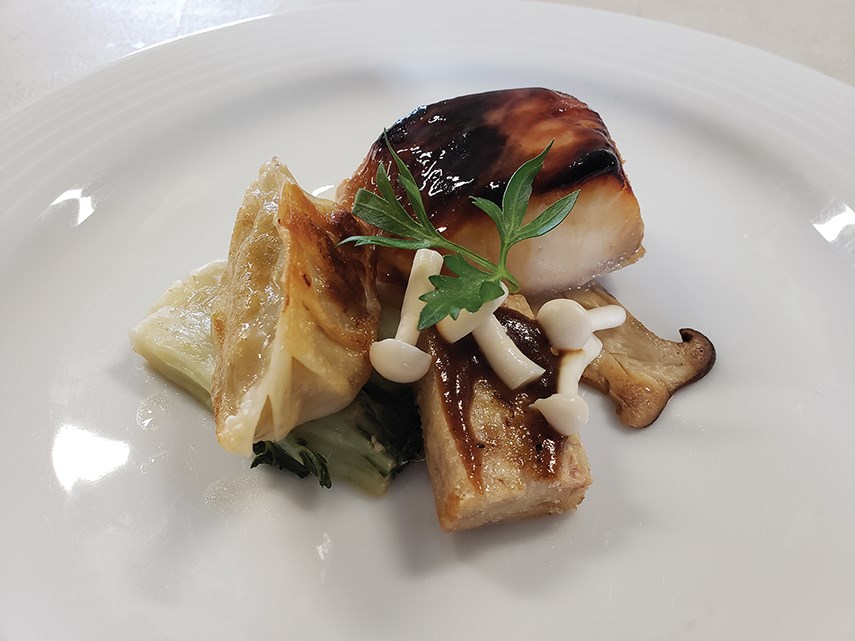West Vancouver’s John Carlo (JC) Felicella is in game mode. His interview answers are precise, instant, and employ the vernacular of someone who is fully entrenched in an area of hyper-specialization.
In less than a month, Felicella will lead his team of culinary competitors to Stuttgart, Germany to compete in the 2020 IKA Culinary Olympics. The Culinary Olympics, organized and hosted by the German Chefs’ Association (properly, the Verband der Köche Deutschlands) is the largest and most prestigious international culinary competition in the world, drawing teams from nearly 60 countries and competitors, support team members, coaches, judges and team managers totalling more than 2,000 people.
Like the sporting Olympics, the Culinary Olympics take place every four years and draw the very best from every kitchen discipline, along with 28,000 spectators and attendees from all over the globe. The event sees national teams go head to head in gruelling, multi-faceted events (the Canadian team has historically performed well in these events) while regional teams compete in a four-day competition focused on a specific discipline. Over 7,000 menus will be cooked over the course of the six-day event.
JC’s team, Culinary Team British Columbia, is one such regional team and will tackle the Community Catering discipline, battling a tough assemblage of other regional teams, including European teams plucked from the ranks of global corporate catering superpowers like Sodexo and Aramark, which have decades of experience and operate to the highest possible standards.
“Regional teams are like farm team for the nationals,” explains Felicella. “The team members are all in their 20s and come from different parts of the province, including the Okanagan, Vancouver, and Vancouver Island.” The 2020 Culinary BC Team members are young and hungry, taking on the world stage for a host of personal reasons as diverse as the team. None of them have yet worked as executive chefs in their respective kitchens but, through their preparations for this competition, have mastered the rigours of cooking for large groups, staying within a tightly prescribed budget, maintaining precise standards and following industry best practices, all while showcasing British Columbia in the best possible light using classic, local ingredients.
The Community Catering category in which Culinary Team British Columbia will compete on Feb. 15 requires the young chefs (represented by five core team members, with reserves waiting in the wings in case of emergency) to produce a meal for 120 guests comprised of industry professionals, media, influencers, government officials, and other delgates. Of these 120 guests, five will be judges and will remain unknown to the competitors. Judges are carefully qualified and instructed on unbiased evaluation, ensuring that points are awarded on the merit of the meal, irrespective of subjective personal tastes.
The meal must be prepared on a staggeringly lean budget of seven euros per guest, must make use of regional ingredients as appropriate, and must be served in specific vessels. The core five-team members have five hours to prepare the ingredients for the meals (they may bring in basic stocks and peeled vegetables, but everything else must be prepared and assembled during the cooking phase of the event) and a tight one and half hours to cook and plate it. The cooking takes place on a high traffic stage where five additional judges will mill about evaluating the food safety and efficiency standards of the team.
Regional teams may win a gold medal against their competitors on their given day of competition, but may not emerge as overall category champions. This is because each team is awarded points for their efforts and only the team with the highest point score wins the overall category.
“We are competing on day one of four,” laments Felicella, who has been both competing on Canadian national culinary teams and directing regional and national teams since 1988. “Sometime judges hold back on their points on day one of the competition because they know there are many more teams to come still. Also, other teams will watch what we do and use the good ideas we have, scrap what didn’t work so well. It’s not ideal.”
Of course, the flipside of the team performing on day one of the event is that they can set the bar impossibly high for the competitors that follow. Felicella has been on national teams that have finished second and fourth from a fiercely competitive pool of 40 or so other teams. I suspect Culinary Team British Columbia is good hands under Felicella’s direction.
The team, which has practiced its competition menu with full execution on eight occasions so far, has honed their offerings, making a final adjustment to their menu barely a month ago, having submitted the official menu to the event organizers back in November. Adjustments like these require resubmission of the entire menu for approval all over again and come with a monetary penalty. Nutritional values of the dishes, photos, and detailed food costs for each dish also need to be submitted in advance of competition.
Culinary Team British Columbia will bring B.C. steelhead trout, sable fish, and Alberta beef (among other regional specialties) to the event to serve as the core ingredients around which plates will be built. Staple ingredients like fennel, celery, onions, and carrots will be sourced locally in Germany.

Felicella’s team, of which there are 13 members in total, has lost a few members along the way, an inevitable phenomenon given the taxing schedules, time commitments, and personal expenses related to competing at this level. “I wish I hadn’t lost a single one, for sure,” says Felicella. “People pursue this for their own reasons. We all want gold, but really it’s about personal accomplishment. You can say you went to hell and back and achieved something you wanted to that not everyone has done. The idea is to represent your region, to do well for the cooks and the culinary world back home, to do it for the people who supported you, your family, friends, and all the people who take pride in the province.”
For the first time ever, two of the three Canadian regional teams will be pitted against each other in the same category. While British Columbia and Alberta are not competing on the same day, the two neighbouring teams are nevertheless chasing best in show in the Community Catering category. Manitoba is the third regional team of Canadian origin.
In addition to requiring a significant time investment from all involved, sending a team to the Culinary Olympics has significant financial implications. Culinary Team British Columbia was able to raise about $150,000 through sponsorship and revenue from catered events.
For more information on the Culinary Olympics, team member bios, and post-competition results in February, visit culinaryteambc.com.



